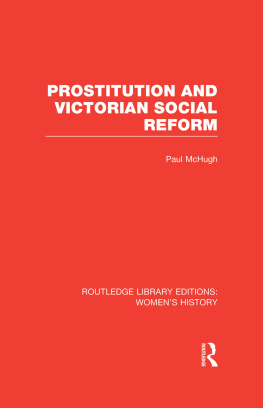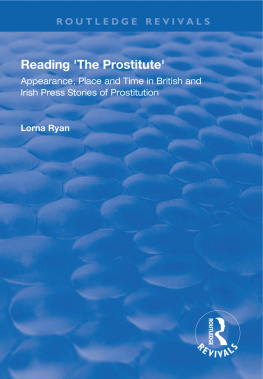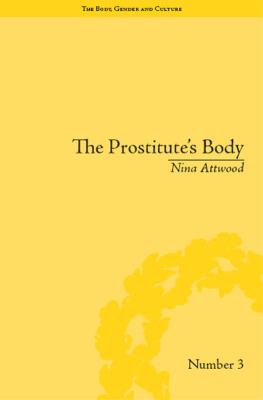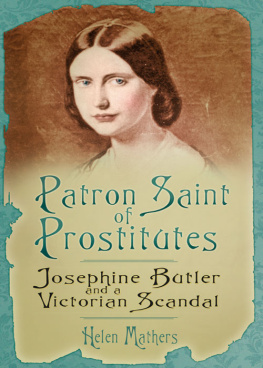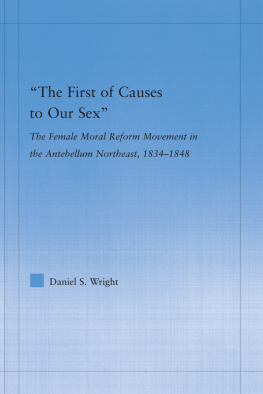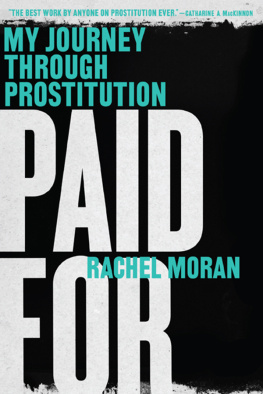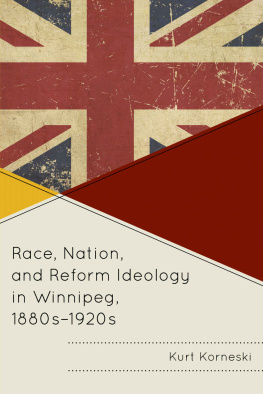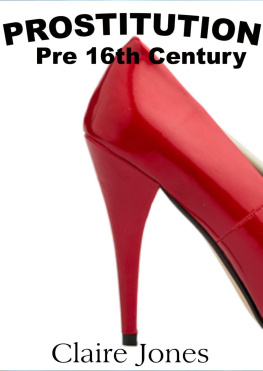ROUTLEDGE LIBRARY EDITIONS:
WOMENS HISTORY
PROSTITUTION AND VICTORIAN
SOCIAL REFORM
Prostitution and Victorian
Social Reform
Paul McHugh
Volume 26
First published in 1980
This edition first published in 2013
by Routledge
2 Park Square, Milton Park, Abingdon, Oxon, OX14 4RN
Simultaneously published in the USA and Canada
by Routledge
711 Third Avenue, New York, NY 10017
Routledge is an imprint of the Taylor & Francis Group, an informa business
1980 Paul McHugh
All rights reserved. No part of this book may be reprinted or reproduced or utilised in any form or by any electronic, mechanical, or other means, now known or hereafter invented, including photocopying and recording, or in any information storage or retrieval system, without permission in writing from the publishers.
Trademark notice : Product or corporate names may be trademarks or registered trademarks, and are used only for identification and explanation without intent to infringe.
British Library Cataloguing in Publication Data
A catalogue record for this book is available from the British Library
ISBN: 978-0-415-53409-3 (Set)
eISBN: 978-0-203-10425-5 (Set)
ISBN: 978-0-415- 62360-5 (Volume 26)
eISBN: 978-0-203-10404-0 (Volume 26)
Publishers Note
The publisher has gone to great lengths to ensure the quality of this reprint but points out that some imperfections in the original copies may be apparent.
Disclaimer
The publisher has made every effort to trace copyright holders and would welcome correspondence from those they have been unable to trace.
| Tables |
Attitudes to Regulation of Witnesses before the
Skey Committee |
Attitudes to Regulation of Witnesses before the 1868
Lords Select Committee |
Attitudes to Regulation of Witnesses before the 1869
Commons Select Committee |
Attitudes to Regulation of Witnesses before the
1870-71 Royal Commission |
Most Active Members of the NA Executive Committee,
1872 |
Most Active Members of the NA Executive Committee,
1883 |
Attitudes of Witnesses to Regulation before the
1879-82 Select Committee |
Party Votes in the Five Major Repeal Divisions on the
CD Acts |
Votes of MPs in CD Acts Divisions Who Described
Themselves as 'Advanced liberal' or 'Radical' |
The Divisions of 1873,1876 and 1883 Distinguishing
Regional Patterns |
The Divisions of 1873,1876 and 1883 Distinguishing
English Boroughs and Counties
|
| Figures |
Most repeal association titles ended with the suffix 'for the repeal of
the Contagious Diseases Acts', some with 'for the Abolition of State
Regulation of Vice'.
| BCGF | British, Continental and General Federation |
| FA | Friends' Association |
| LNA | Ladies' National Association |
| MCEU | Midland Counties Electoral Union |
| NA | National Association |
| NCL | Northern Counties League |
| NMA | National Medical Association |
| SDL | Subjected Districts League |
| SNA | Scottish National Association |
| WMNL | Working Men's National League
|
| EA | Association for Promoting the Extension of the Contagious
Diseases Acts |
| NEL | National Education League |
| UKA | United Kingdom Alliance |
| VA | Vigilance Association (for the Defence of Personal Rights)
|
| BL | British library |
| EC | Executive Committee |
| FLB | Fawcett library (Josephine Butler MSS) |
| FLW | Fawcett library (H.J. Wilson MSS) |
| PP | Parliamentary Papers |
| PRO | Public Records Office |
For Caroline
What makes the historian decide to work on a particular subject? In my case, I fear that I cannot claim that any elevated motive set me on the trail. In the Autumn of 1969, as a new postgraduate student in search of a suitable topic, I decided to read through the then standard work on the period of British history which most interested me Sir Robert Ensor's England, 1870-1914. Upon reaching page 171, promisingly titled 'sex questions', I came across a two paragraph reference to the Contagious Diseases Acts which were then a mystery to me. As a summary of an agitation it aroused my interest, while the glowing tributes to Josephine Butler and James Stansfeld provoked a degree of irreverent scepticism. I was 'hooked'. I cannot remember whether or not I continued to plough on through Ensor, but certainly I have found no other subject which has exercised the same fascination for me as the resurrection of this apparently obscure and forgotten campaign.
Over the years, less opportunistic motives have come to the fore. I speedily abandoned any idea of a Lytton Strachey type demolition of Ensor's hero and heroine. His verdict stands up remarkably well even if he tended to exaggerate the deliberateness of Stansfeld's self sacrifice. Instead, I have tried to go beyond the biographical approach and to breathe some life into the campaign as a whole. I hope that the result is a study which sees the agitation not merely as a contribution to women's history, nor as simply one aspect of a changing moral climate, nor even as a part of the political history of the period, but as a campaign which needs to be assessed in its own right. My aim has been to reach a balanced assessment of the struggle for repeal, looking at Mrs Butler and Stansfeld not as 'makers' of the movement (with all the moral overtones thereby implied) but as pressure group leaders with strengths and weaknesses. In the process I hope that I have brought out the significance of humbler repeal activists more forcefully.
In the course of my research I have incurred numerous debts of gratitude to the staffs of many libraries and archives. To acknowledge all would fill too many pages, but if some may be singled out, I should say that the Bodleian Library was a most congenial place in which to read one's way into the repeal campaign, and that I received a kindly welcome and much assistance at the library of the Society of Friends and at the Methodist Archives and Research Centre. My chief obligation, however, is to the Fawcett Library where I spent several summers working on repeal material. Its then librarian, Miss M. Surry ALA, and the archivists were extremely kind in answering my requests. In particular, the library was good enough to grant me access to the Josephine Butler Papers while they were still being arranged. I am most grateful for this privilege, and I should like to extend my thanks to the cataloguer of these papers, Miss M. Burton, for much assistance on Mrs Butler, about whom her knowledge is surely unrivalled. As the arrangement of these papers and of the H.J. Wilson Papers at the Fawcett Library was not completed when I was working on them, some of my references are necessarily provisional, though I have tried to give the fullest possible details in all cases. It is a matter of relief and a cause for celebration that this splendid library, the future of which seemed unclear a few years ago, has now been rehoused intact at the City of London Polytechnic, where scholars receive the same warm welcome as in the old days at Westminster. Professor John Vincent of Bristol University was good enough to set me on the track of the Stansfeld Papers whose present owner, Mr W.J. Stansfeld, readily granted me access. I am indeed grateful to him for doing so, and I should also like to offer my thanks to his brother, Mr A. Stansfeld, for providing me with a copy of a letter from William Lloyd Garrison to James Stansfeld's sister-in-law, Madame Venturi.

